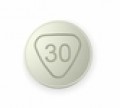Priligy was first invented by Eli Lilly Pharmaceutical and subsequently sold to Johnson & Johnson in 2003. Priligy is sold in Europe and Asia, but is still in development in the US. Menarini handles production for non-US markets. Priligy is designed as a cure for premature ejaculation and should be taken one to three hours before sexual activity. Priligy works on approximately 80% of patients and doubles or triples time before ejaculation. Priligy can be taken with food but should never be taken with alcohol. Only one tablet should be taken per day — overdosing on Priligy isn’t possible, but there are various health concerns associated with large doses nonetheless.

Does it really works?
Priligy primary ingredient is dapoxetine, a white, insoluble powder. Dapoxetine inhibits serotonin transporters, increasing the intensity of the post synaptic cleft. This in turn causes a delayed ejaculation. Dapoxetine was first intended to be an antidepressant, but it’s short biological half life (only one and a half hours) makes it unsuitable as an antidepressant. However, this property makes it an excellent choice for premature ejaculation treatment. It is metabolized mostly in the live and kidney by common enzymes such as CYP2D6 and CYP3A4 and the resulting waste is discarded in urine. Dapoxetine molecular formula is C21H23NO.
Priligy is mildly addictive and is has been with neurocognitive adverse effects, primarily anxiety, mania, mood swings, and suicidal thoughts. However, there is conflicting and insufficient research to determine whether this is true or not.
Priligy is associated with some severe side effects, including the standard allergy list: rash, swelling, and difficulty breathing. If you experience any of these, call a doctor immediately. Untreated allergy symptoms can be lethal.
Priligy should never be taken in conjunction with a monoamine oxidase inhibitor such (moclobemide, phenelzine, tranylcypromine), selective serotonin reuptake inhibitors (amitriptyline, citalopram, fluoxetine, fluvoxamine, mianserin, nefazodone, nortriptyline, paroxetine, venlafaxine), thioridazine (Aldazine), triptans (sumatriptan, Imigran), tramadol (Tramal), lithium (Lithicarb), blood thinners (Coumadin, Marevan), fungal infection treatments (Nizoral, itraconazole, Sporanox, Diflucan), HIV medicines (Norvir, Invirase, Viracept, Reyataz), painkillers (ibuprofen, Nurofen, aspirin), or antibiotics (erythromycin, clarithromycin).
Few precautions
Do not take Priligy for two weeks after the last dose of one of these drugs, as they can linger in your system for a very long time. People under 18 should not take Priligy (and it is unlikely to have any effect anyways). Likewise, people over 65 and women should avoid Priligy. Never take expired drugs of any kind, including Priligy.
People who have a history of low blood pressure, heart problems, hemophilia, depression, fainting, suicidal thoughts, psychiatric disorders, mania, hallucinations, bipolar disorder, seizures, epilepsy, liver issues, kidney issues, sexual dysfunction, and blindness should not take Priligy.
Where to buy Priligy?
Priligy does not require a prescription and be easily purchased online from stores such as viagrastoreaustralia.com. It comes in pills or tablets, each of which costs 2 to 3 dollars (cheaper the more you buy). Each pill contains 30, 60, or 90mg of dapoxetine. The recommended dose is 30mg to start with. Generic Priligy can be purchased for a fraction of the branded cost on stores such as viagramelbourne.com, where each pill costs around a dollar.
